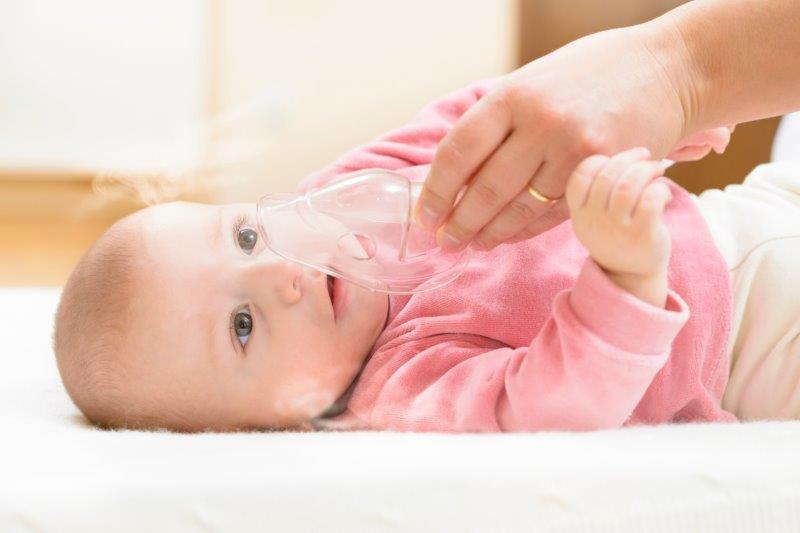This page has been automatically translated. Please refer to the page in French if needed.
Respiratory infection
Bronchiolitis Epidemic: The Right Things to Do to Protect Your Child
Publié le 28 novembre 2023 - Directorate for Legal and Administrative Information (Prime Minister)
Due to the increasing bronchiolitis epidemic in France since the beginning of November, it is important to know the right behaviors to take to reduce transmission of the virus and to react if your child under 2 years old shows signs of bronchiolitis. Service-Public.fr explains everything in detail.

Bronchiolitis is a viral respiratory infection which mainly affects children under 2 years of age. The disease is usually caused by respiratory syncytial virus (RSV), which causes inflammation of the walls of the bronchioles (the smallest bronchi). It is characterized by shortness of breath with signs such as coughing and rapid wheezing. To learn more about symptoms, you can visit the Health Insurance page " Recognizing Bronchiolitis ”.
Because bronchiolitis is a highly contagious disease, simple actions can reduce the risk of transmitting the virus. It is also important to know the right behaviors to adopt in case of bronchiolitis in an infant.
How can we reduce the risk of transmitting the virus?
To reduce virus transmission within the family, here are the prevention measures to be adopted :
- Wash hands for 30 seconds, with soap and water or alcohol before and after contact with the baby.
- open the windows of the room where the baby sleeps for at least 10 minutes a day;
- avoid, where possible, taking children to confined public places (public transport, shopping malls, etc.) where they might be in contact with people with colds;
- limit visits to the circle of very close and unsick adults, no kissing or arm-to-arm passage, avoid visits from young children to infants under 3 months of age;
- not sharing unwashed bottles, pacifiers or cutlery;
- regularly wash toys and soft toys;
- do not smoke next to babies and children.
And when you have a cold yourself:
- cover your mouth with your elbow or sleeve when coughing or sneezing;
- Wearing a mask while caring for a baby;
- avoid kissing the baby on the face and hands.
You can consult the page “ Preventing bronchiolitis from occurring ”.
Please note
since september 15, a new treatment to prevent severe forms of bronchiolitis can be delivered free of charge to children under one year of age who are experiencing their first winter this year.
What if your baby shows signs of bronchiolitis?
The immense mmost bronchiolitis is benign and heals spontaneously within days. There is no specific anti-virus treatment. Also, because the infection is viral, antibiotics are useless. Cough is essential to evacuate secretions: anti-cough drugs (syrups, thinners...) are contraindicated in small children.
Since bronchiolitis does not necessarily require hospitalization, you should consult your doctor first. It will give you care instructions (feeding, hydration, cleaning and regular clearing of the nose of your child, especially for children under 6 months who are not yet able to breathe through the mouth).
Symptoms may worsen during the first few days, then gradually improve. The cough usually lasts for 8 to 10 days and sometimes even weeks. The attending physician can also explain how monitor the progress of symptoms your child, to check for any worsening condition that warrants a new visit or hospital treatment.
Reminder
simple things to do for the duration of your child’s bronchiolitis symptoms:
- keep the nose clear through regular deobstructions as per the HAS-explained method ;
- split meals (offer more often but in small amounts). Coughing may cause vomiting after a bottle but thickening the milk is not effective, so bottles should be shrunk.
For bronchiolitis in an infant, it is important to know how to react (when to consult?) and what good things to do to relieve your child.
Please note
bronchiolitis occurs as outbreaks in the fall as early as october and in the winter. It commonly affects infants 2 to 8 months of age. Every year in France, 30% of infants younger than 2 years old are affected.
When to worry?
If your child has any of the following, hospitalization may be necessary:
- He is less than six weeks old;
- a premature infant under three months of age;
- already have an identified respiratory or cardiac disease;
- he drinks less than half of his bottles at three consecutive meals;
- they vomit systematically;
- they sleep continuously, or they cry unusually and cannot fall asleep.
However, before going to the emergency department, it is recommended that you call the 15 which will tell you the most appropriate support.
FYI
in France, there is a monitoring of bronchiolitis in children. However, there is no surveillance for vulnerable adults (pregnant women, immunocompromised people, people aged 65 or over, chronic diseases, etc.).
Additional topics
Service-Public.fr
National Health Insurance Fund (Cnam)
Ministry of Health
Ministry of Health
Public Health France
Agenda
Du 14 avr. au 15 juin 2025
Prévention
Publié le 02 avril 2025
À partir du 2 avr. 2025
ETA
Publié le 24 mars 2025

